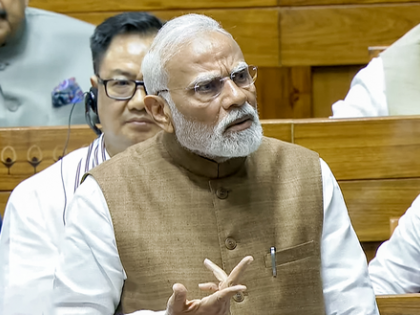‘Nehru failed to foresee long-term consequences’: PM Modi exposes Congress
By IANS | Updated: July 29, 2025 20:14 IST2025-07-29T20:07:27+5:302025-07-29T20:14:35+5:30
New Delhi, July 29 Prime Minister Narendra Modi launched a wide-ranging critique of the Congress party’s historical decisions ...

‘Nehru failed to foresee long-term consequences’: PM Modi exposes Congress
New Delhi, July 29 Prime Minister Narendra Modi launched a wide-ranging critique of the Congress party’s historical decisions on national security, diplomacy, and territorial integrity - describing them as strategic missteps that compromised India’s interests for decades.
From the Indus Waters Treaty to the return of Haji Pir Pass, PM Modi argued that a pattern of diplomatic naivety had allowed adversaries to exploit India’s generosity while the people bore the cost.
PM Modi’s remarks revisited Prime Minister Nehru’s 1960 signing of the Indus Waters Treaty with Pakistan, calling it “his biggest blunder.”
Quoting Nehru’s statement to diplomat T.N. Gulati - “I hope this agreement opens the way to solving other problems” - PM Modi suggested that Nehru failed to foresee long-term consequences.
“He could only see the immediate effect,” PM Modi said. “But this agreement left the country trailing behind.”
He emphasised that India has now corrected that error, effectively suspending the treaty in the interest of farmers, invoking the principle that “blood and water cannot flow together.”
The Prime Minister also lambasted Congress’s foreign policy posture during episodes of heightened tensions. He pointed to the Most Favored Nation (MFN) status granted to Pakistan in 1996, alleging that Congress governments continued to uphold it even after Pakistan-backed terror attacks.
“While they sent terrorists to play Holi with blood,” PM Modi said, “Congress held mushairas here, hoping for peace.”
The present government, he stressed, revoked MFN status, stopped visas, and closed the Attari-Wagah border.
PM Modi recalled historical military and territorial concessions; Congress leaders, between 1962 and ’63, reportedly proposed handing over key regions in Jammu and Kashmir such as Poonch and Kishanganga.
The 1965 war’s Haji Pir Pass victory was undone through post-war diplomacy. And in 1971, despite India holding 93,000 Pakistani POWs, Kartarpur Sahib remained in Pakistan.
“With some strategic foresight, we could have changed history,” PM Modi said.
“But they missed the opportunity.”
He highlighted further decisions - accepting mediation over the Rann of Kutch in 1966, handing over Kachchatheevu Island to Sri Lanka in 1974, and resuming talks with Pakistan just weeks after the 26/11 Mumbai attacks.
“Even after 26/11, their love for Pakistan remained undiminished,” PM Modi asserted. “They did not even expel one diplomat.”
PM Modi also made references to the UPA-era security landscape. He described pre-2014 India as a nation gripped by fear and indecision, and contrasted it with what he called his government’s assertive doctrine — revoking outdated treaties, clamping down on terror networks, and reclaiming strategic agency.
“We’ve stopped the one-way traffic of terrorism and misplaced hope,” he said. “This is the diplomacy they now lecture us about.”
The address marks a significant moment in PM Modi’s campaign narrative - a deliberate attempt to remind voters of India’s historical vulnerabilities while positioning his government as the architect of strategic correction.
Disclaimer: This post has been auto-published from an agency feed without any modifications to the text and has not been reviewed by an editor
Open in app